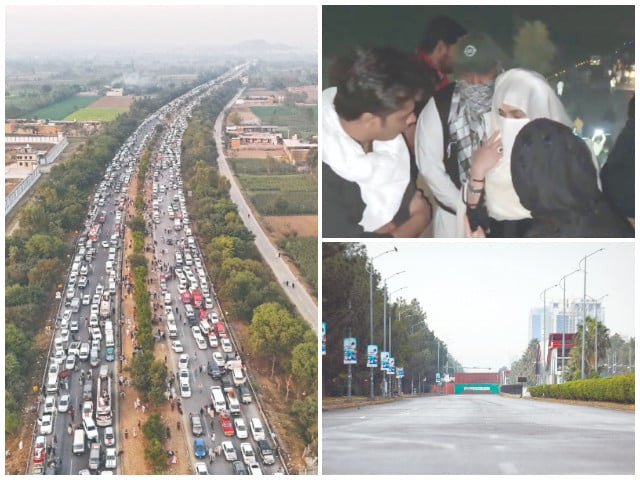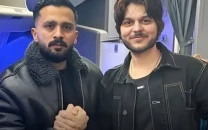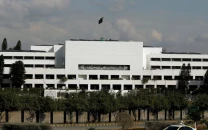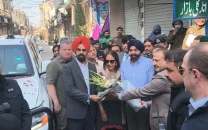Defiant PTI marchers knock on capital door
Clashes reported from Attock bridge hundreds arrested

The Pakistan Tehreek-e-Insaf (PTI) embarked on a collision course with the government on Sunday as it finally started marching toward the federal capital after refusing to call off the 'final' protest call given by the imprisoned party founder Imran Khan for his release, among other things.
The routes leading to the twin cities of Islamabad and Rawalpindi have been closed with containers and heavy contingents of the law-enforcement agencies (LEA) personnel were deployed to meet any eventuality.
The PTI rallies from Khyber-Pakhtunkhwa (K-P) led by Chief Minister Ali Amin Gandapur, as well as from different cities of Punjab, began advancing towards the D-Chowk – located right in front of the Parliament House in the Red Zone of the federal capital.
A large PTI procession from K-P entered Punjab from the Attock bridge, Chach Interchange and Ghazi Barotha Canal. The convoy of vehicles stopped at Ghazi for a while, where Chief Minister Gandapur and Bushra Bibi, wife of Imran Khan, addressed the supporters urging them to move forward.
When another convoy, coming from Haripur, reached the Attock Bridge, the police resorted to tear gas shelling. The protesters, meanwhile, set fire to the green belts around them, while a Suzuki van parked at Ghazi Bridge was also torched. A policeman was injured when directly hit by a motorcycle rider.
The PTI, after entering Punjab, changed its strategy and directed the convoys coming from the Hazara Division, which had reached Taxila under the leadership of Omar Ayub, to join Gandapur-led convoy. Clashes were also reported from the Isakhel Interchange in Dera Ismail Khan.
The PTI gave its final call for the protest to meet its four demands: release of all political prisoners, including Imran Khan, reversal of the 26th Constitutional Amendment, restoration of democracy and Constitution in the country and return of allegedly "stolen mandate".
The demands surfaced on November 13 after Imran had urged people via a post on X, formerly Twitter, to reach Islamabad and not to return until those were met. The PTI had said that its rallies would be converted into a sit-in in the federal capital and end only when the demands were met.
Since then, the Pakistan Muslim League-Nawaz (PML-N)-led government, backed by a recent order of the Islamabad High Court (IHC), has been stating that neither the protestors would be allowed to enter the capital nor any leniency would be shown to them this time around.
In anticipation of a possible head-on collision between the authorities and the protesters and in view of the visit by Belarus President Alexander Lukashenko, the government decided to place containers to block all the main arteries leading to Islamabad.
The blockade has brought the twin cities as well as several other cities in Punjab to a standstill. A surprising decision was the sudden beginning of the repair work on different motorways. Besides, the government also shut down the internet in several areas.
The interior ministry had already announced a day ago that WiFi and mobile internet services would be suspended in areas with "security concerns" but it would remain operational in the rest of the country. Nevertheless, internet tracking monitor Netblocks said WhatsApp backends were restricted in Pakistan.
The decision was part of the government's strategy to block communication ahead of the planned protests. Amid this, both sides remained steadfast, refusing to back down until achieving their objectives.
Before the march began, the federal and Punjab governments imposed Section 144 of the Criminal Procedure Code (CrPC)a legal measure enabling district administrations to ban public gatherings temporarilyand denied PTI permission to hold the protest.
Nevertheless, PTI took to the streets, with Gandapur leading the march from the party's stronghold in Khyber-Pakhtunkhwa, joined by the provincial leadership, workers, supporters, and Imran Khan's wife, Bushra Bibi. Though the caravans had entered Punjab, they were unlikely to reach Islamabad by Sunday night.
In a brief address to workers in Swabi, Gandapur urged them to press forward and not retreat until Imran Khan's release, calling on protesters to use all their strength to clear the path to the federal capital.
As the PTI convoy reached the Punjab boundary, the police started shelling on them at the Attock Bridge, Chach interchange and Ghazi Barotha canal areas. Later, Gandapur directed the convoy to stop at Ghazi Maqam for a while, urging the workers to get ready, because there was a "battle ahead".
Meanwhile, it was reported that Imran Khan's wife, Bushra Bibi, also addressed the workers and asked them to quickly move ahead in their vehicles instead of walking along the march, stressing they would have to move fast and shouldn't come back without bringing Imran Khan back.
While the K-P saw the largest mobilisation of the participants, the rallies also set out from various parts of Punjab, Sindh, and Balochistan. In Punjab, opposition supporters marched from cities, including Lahore, Rawalpindi, Gujranwala, Sialkot, Mianwali, Kasur, Okara, and Vehari, among others.
Despite heavy police and Rangers' deployment, many PTI workers managed to breach barricades and evade restrictions, in an attempt to reach the capital. Throughout the day, the PTI workers and LEA officials kept clashing in different parts of Punjab.
A media report suggested that several PTI leaders, including PTI's chief whip in the National Assembly Amir Dogar and Zain Qureshi were arrested from Multan. Reports attributed to the Punjab police spokesperson said that around 600 people had been arrested for violating Section 144 in Punjab.
Meanwhile, Interior Minister Mohsin Naqvi promised on Sunday to restrict protestors outside Islamabad. Naqvi took an aerial view of Islamabad, Rawalpindi and Attock to review security arrangements in the three cities. He expressed satisfaction with the arrangements.
Naqvi stated that necessary measures had been taken to ensure peace and public order in compliance with the IHC's order. He added that police and paramilitary Frontier Corps (FC) and Rangers were diligently performing their duties.
The government had taken all possible measures to protect the lives and property of the citizens and that strict action would be taken against "miscreants" in accordance with the law, the interior minister emphasised.
He made it clear that no one would be allowed to disrupt the law and order in the capital, and that the administration, police, and LEAs were prepared to deal with any possible situation. He mentioned that Belarus president's visit was crucial in strengthening relationship between the two countries.



















COMMENTS
Comments are moderated and generally will be posted if they are on-topic and not abusive.
For more information, please see our Comments FAQ